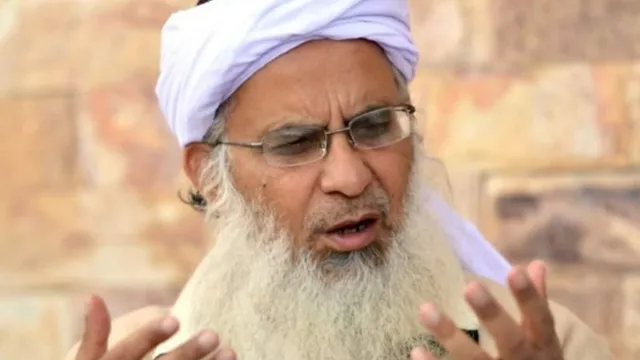- By Shivangi Sharma
- Tue, 06 May 2025 03:43 PM (IST)
- Source:JND
In a fiery public address, Islamabad’s Lal Masjid cleric Abdul Aziz Ghazi criticised Pakistan, questioning its credibility, governance, and treatment of its own citizens amid the escalating tensions with India. Ghazi opened his remarks with a question to his audience, "If Pakistan fights against India, how many of you would support Pakistan and fight for it?"
When no hands were raised, he remarked, "This means there is enough understanding," indicating a growing disillusionment among Pakistanis toward state narratives about nationalism and conflict. He argued that the looming conflict with India is not an Islamic war, but a political confrontation lacking popular legitimacy or moral grounds. “The issue is that the war between Pakistan and India is not an Islamic war,” he emphasised.
Sharp Rebuke Of Pakistan’s Establishment
Ghazi did not hold back in condemning Pakistan’s governance structure, declaring, “Today, Pakistan has a system of disbelief – a cruel, useless system. It is worse than India.”
Pointing to the military operations in Balochistan and Khyber Pakhtunkhwa, he also accused the Pakistani state of committing atrocities against its own people, "When the people were ready, the state bombed its own citizens." He questioned whether India had ever used fighter jets against its own citizens in the way Pakistan has done in tribal regions like Waziristan.
⚡️Listen to the Imam of Lal Masjid, Islamabad, Pakistan, Abdul Aziz Ghazi, who urges people to not support Pakistan in case of the India Pakistan war. He further said that "we (muslims) are more oppressed in Pakistan than in India. Pakistani forces bomb our own muslims in… pic.twitter.com/e2bcjiMYca
— Raja Muneeb (@RajaMuneeb) May 5, 2025
ALSO READ: India-Pakistan Tension: What Is Per Day Estimated Cost Of Short And Long Term War? Explained
Disappeared Voices And Growing Frustration
Highlighting the issue of enforced disappearances, Ghazi drew a comparison between the treatment of Muslims in India and Pakistan, "We (Muslims) are more oppressed in Pakistan than in India. Pakistani forces bomb our own Muslims, India doesn't do that with Indian Muslims.”
He lamented the disappearance of clerics, journalists, and members of the opposition Tehreek-e-Insaf party. "Here, people are exhausted from staging protests in search of their loved ones," he said, alluding to the widespread frustration and fear across the country.
Tensions With India Escalate
The cleric’s comments come amid growing hostilities between Pakistan and India following a deadly terror attack on April 22. In retaliation, India suspended the 1960 Indus Waters Treaty, blocked Pakistani vessels from its ports and airspace, and began distancing diplomatically. In response, Pakistan suspended the 1972 Simla Agreement, halted bilateral trade, and closed its airspace to Indian airlines.

